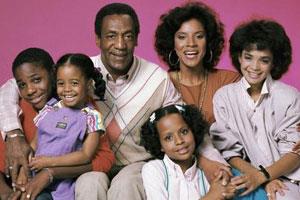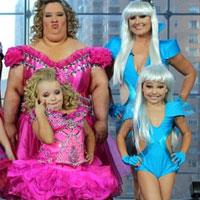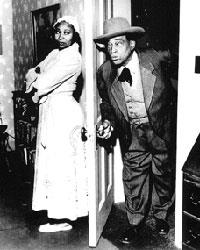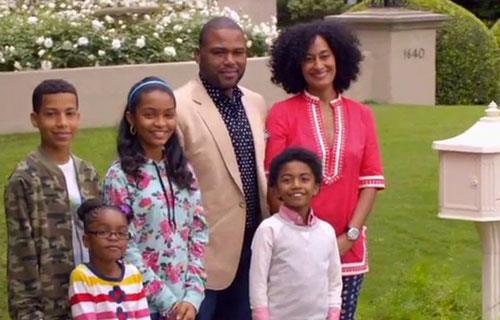Thirty years after NBC's The Cosby Show introduced 34 million American homes to a well-to-do African-American family, ABC wants to up the ante with the comedy black-ish (premiering Wednesday at 9:30 p.m. ET)...
 It’s always an occasion for uneasy conversation among friends across that Continental Divide of race in America when national TV wants to show audiences what life is like for African Americans. Viewers of a seasoned age will recall the initial black cast / family on TV, Amos ’n' Andy. That minstrelsy, brought over from radio, wasn’t at all a source of pride in African-American households, but it was a look at actors who weren’t in service to whites. Peel away the layers of buffoonery, and there was a story with historic links to how lodges and fraternal organizations were sources of economic development and mutual assurance to a population zoned by law and by practice inside segregation.
It’s always an occasion for uneasy conversation among friends across that Continental Divide of race in America when national TV wants to show audiences what life is like for African Americans. Viewers of a seasoned age will recall the initial black cast / family on TV, Amos ’n' Andy. That minstrelsy, brought over from radio, wasn’t at all a source of pride in African-American households, but it was a look at actors who weren’t in service to whites. Peel away the layers of buffoonery, and there was a story with historic links to how lodges and fraternal organizations were sources of economic development and mutual assurance to a population zoned by law and by practice inside segregation.
A generation later, The Cosby Show demonstrated in sharp contrast that thoughtful, successful and positive black families did in fact exist – despite an off-putting observation by a Pulitzer Prize-winning critic who once called the TV family Huxtables “black like nobody else.”
That was the buzz of the time: The Cosby Show family was so well-to-do that they didn’t exist in real life. That short-sighted and ill-informed observation, and the conversations that accompanied it, showed just how little America knew of life for African Americans.
 That’s precisely the danger of relying on TV situation comedies to show “real life.” Did Father Knows Best, Leave it to Beaver or The Donna Reed Show portray life for every white family in America? It’s an obvious answer that all viewers know well. The difference for white families depicted in those shows is that the ideal was conveyed, repeated, copied and engraved repeatedly before All In the Family, Married With Children and a few other notable zags from Robert Young and Donna Reed hit the small screen.
That’s precisely the danger of relying on TV situation comedies to show “real life.” Did Father Knows Best, Leave it to Beaver or The Donna Reed Show portray life for every white family in America? It’s an obvious answer that all viewers know well. The difference for white families depicted in those shows is that the ideal was conveyed, repeated, copied and engraved repeatedly before All In the Family, Married With Children and a few other notable zags from Robert Young and Donna Reed hit the small screen.
So-called reality shows shouldn’t be compared to scripted and edited sitcoms, but just imagine if a sitcom version of Duck Dynasty and Here Comes Honey Boo Boo had been presented in the 1950s and ’60s. The Beverly Hillbillies don’t count in this argument. And The Life of Riley wasn’t nearly so degrading to white middle-class families.
 Black family comedies on TV have a reed-thin connection to the home life of most African Americans. Economic data and societal measures, for the most part, tell a different story in reality, in spite of what might have been conveyed by Good Times and The Jeffersons. All those comedies do, however, share the common thread of familial bond. Even George “Kingfish” Stevens loved his wife Sapphire, though their combative relationship belied that. And there’s no doubt how Cliff Huxtable felt about Claire and their children. Maybe that’s because along with the lead actor’s comedy genius, Cosby had a not-really-secret weapon in the wings. Dr. Alvin Poussaint, a brilliant psychiatrist and noted author, was a show consultant and adviser to Cosby.
Black family comedies on TV have a reed-thin connection to the home life of most African Americans. Economic data and societal measures, for the most part, tell a different story in reality, in spite of what might have been conveyed by Good Times and The Jeffersons. All those comedies do, however, share the common thread of familial bond. Even George “Kingfish” Stevens loved his wife Sapphire, though their combative relationship belied that. And there’s no doubt how Cliff Huxtable felt about Claire and their children. Maybe that’s because along with the lead actor’s comedy genius, Cosby had a not-really-secret weapon in the wings. Dr. Alvin Poussaint, a brilliant psychiatrist and noted author, was a show consultant and adviser to Cosby.
For all the Census data that describe what life is like in America for persons of African descent, TV sitcoms just don’t accurately measure up. The key there, of course, is comedy. Documentaries, in the main, aren’t funny; they’re not supposed to be.
Imbedded in this observation is this reality: Black Americans have a shared experience in the broadest sense of how race is lived in the U.S., but region by region down to household by household, African Americans have varied experiences. So the Huxtables might be more familiar to college-educated professionals than Chris Rock’s family in Everybody Hates Chris. It’s difficult to find any redeeming quality in Meet the Browns. The show is over the top clownish -- but remember how Kingfish loved Sapphire.

black-ish stands squarely on the shoulders of every attempt by TV comedy to show the lives of African Americans. Anthony Anderson, who portrays a successful executive, and Tracee Ellis Ross, playing his physician wife, are a prosperous couple whose four children know less than zero about what life is like for most African Americans. Laurence Fishburne, in his first comedy role, (top, with Anderson) portrays the live-in grandfather whose black experience is oh so familiar, and an often painful reminder to his successful son.
The pilot gets off a few good lines, but much like the lead-in the show will get from Modern Family, the quality of writing will determine success. Does that seem too obvious? The point is that the cross-cultural gags – a son who wants a bar mitzvah – could get exhausted quickly. The writers will have to go deep to examine situations that are both real and can be spun into humor, closer, notably, to the satire of Modern Family and Frasier before it.
Some of the pursuits and observations by the woefully sheltered children in black-ish come straight from reality. They are both funny and painful. African-American children who grow up in the suburbs do have some stinging cultural entanglements, particularly when they hit puberty and begin dating.
The black-ish family is, nonetheless, African American, and their journey of discovery is poised to entertain and inform “the great unwashed” TV viewing audience. That’s more than a little disconcerting, but it’s the reality of prime time TV.